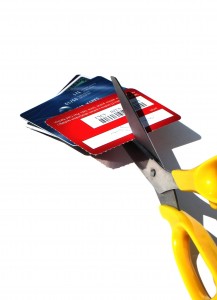Your credit score is extremely important in the world in which we live. Nowadays it’s hard to buy anything without having a good credit rating. In some cases, it’s impossible to get a job if your credit score isn’t very good. Because it’s central to your life, you may be punishing yourself by unknowingly doing things that lower your score. Following are a few tips regarding how you could be hurting your credit score.
Getting Rid of Old Credit Cards

Not Bothering to Fill out a Change of Address Form
If you move, make sure you fill out a change of address form with the U.S. Postal Service. Failing to do so could cause your credit card bills to be undeliverable, which would mean you wouldn’t know when the bill was due and wouldn’t pay it on time. This will, in turn, lower your credit rating, because you’d be overdue on your payments. In order to avoid confusion, you should not only fill out the forms with the post office, but you should inform the credit card companies of your change of address.
Accepting No-Limit Credit Cards
When you apply for a new credit card, you will usually be advised of a credit limit on that card. In some cases, the issuing company won’t include a credit limit, which can damage your credit rating. The reason is that when the credit card company reports that you don’t have a limit, it comes across to the reporting agencies as a limit of $0.00. When you use the card, whatever amount you charge may be reported as being over your limit, which damages your credit rating.
Not Making Your Payments on Time
One of the more obvious reasons that your credit rating could suffer is not paying your bills on time. If you’re consistently late with your payments, or actually miss a couple, your credit rating will go down considerably. Make every effort to get your payments in on time, and in full, if possible.
Letting Your Debts Go to Collection Agencies
Among the things that could hurt your credit rating is to have your account turned over to a collection agency. Having that on your credit history will be extremely damaging. You should make every effort to satisfy your debts or make payment arrangements before they are turned over to a collection agency.
Defaulting on a Loan
Another way that you could damage your credit rating severely is to default on a loan. Credit reporting agencies regard defaults the same as credit card charge-offs, because it means you haven’t lived up to your promise of paying your debts in full and on time.
Bankruptcy
Having a bankruptcy appear on your credit history will more than likely destroy your credit score. It can be devastating, and it may take years to recover. Do everything in your power to avoid declaring bankruptcy. You should get credit counseling, borrow from friends and relatives if you have to, and take whatever legal steps are available to steer clear of a bankruptcy. It could be your credit death knell.
Using Your Entire Credit Limit
If you utilize all, or a major percentage, of the credit that is available to you, your credit rating will most likely go down. That’s because your credit rating is computed, in part, on how much of your available credit you actually use. The lower the percentage of your available credit that you make use of, the higher your credit rating will be.
